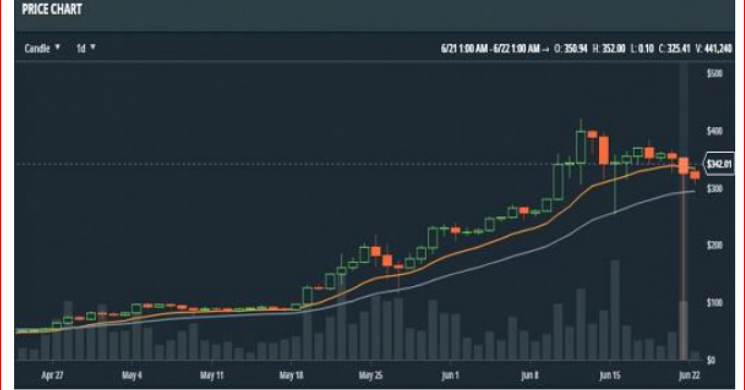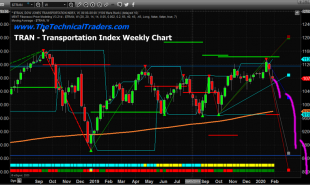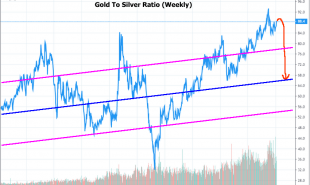
UPDATE 12:27: Crypto Crash Victim Explains Problem after Wipe-Out
------------------------------------------------------------------------------------
Blockchain blockchain blockchain.
CNBC Reports
The price of ethereum crashed as low as 10 cents from around $319 in about a second on the GDAX cryptocurrency exchange on Wednesday, a move that is being blamed on a "multimillion dollar market sell" order.
Ethereum is an alternative digital currency to bitcoin and had been trading as high as $352 on Wednesday. It has since rebounded from its flash-crash lows to trade to about $325 on the GDAX exchange. According to industry and price tracking website Coinmarketcap, which takes into account the price on several exchanges, ethereum was trading around $338.
Adam White, the vice president of GDAX which is run by U.S. firm Coinbase, posted on the exchange's blog, outlining what took place at around 12:30 p.m. PT on Wednesday. According to White, the multimillion dollar market sell order resulted in a number of orders being filled from $317.81 to $224.48.
On Wednesday, the price of ether -- the cryptocurrency of the Ethereum blockchain -- on the GDAX exchange briefly crashed from $328 to $0.10. The story seems to be that there was a big market sell order that blew through a lot of the buy orders on the book, pushing the price down. This triggered forced selling by margin accounts, blowing through the rest of the buy orders until the price hit 10 cents. "We understand this event can be frustrating for our customers," said GDAX, but everything is fine: "Our matching engine operated as intended throughout this event and trading with advanced features like margin always carries inherent risk."
IS IT SAFE? (Second Candle from the End)
Current Crypto Prices HERE
Here's Matt Levine's detective work on the topic
The basic appeal of the cryptocurrency revolution, to people like me who are not making any money off of it, is that it is fun to watch people rediscover all of the lessons of financial economics, one at a time, in public. This week's lesson was: "Don't use market orders for big trades in an electronic market!" It's an important lesson, and not an obvious one -- people get it wrong in the stock market all the time -- but also pretty niche. "If you want to avoid flash crashes, stick to limit orders," is a useful tip, but not, like, an important organizing principle for a society.
There's another lesson here though. A Reddit post from a margin trader highlighted that, in ether, unlike in stocks or bonds, there no margin calls: If you fall below the margin trigger, the broker or exchange doesn't ask you to put up more money; it just liquidates your position. "An area of thought to think about is whether or not GDAX could have offered margin calls on their margin product," writes the redditor, but...
However, doing so shifts liability over to GDAX, and it's simply not mature enough to stomach that kind of risk. For example, if the crash was from a critical flaw in Ethereum's code and GDAX waited to liquidate to give traders time to add more funds, it opens itself up to defaults on those funds. Someone could say "the check is in the mail" and then just walk away.
The basic idea of blockchain innovation is that it replaces longstanding human institutions of trust and tradition with immutable efficient code. No one needs to trust anyone in the blockchain; everything operates automatically and in public. And bitcoin/blockchain/smart-contract developers really have done impressive work in, as it were, automating trust, replacing trust in humans and institutions with with trust in code. But I suspect there are fundamental limits to that approach. A market in which people trust each other a little bit -- they collateralize loans, sure, and trade electronically, but they occasionally pick up the phone and try to work things out like reasonable humans -- seems likely to be more efficient than a purely trust-free one.
Elsewhere, here is Civil, "an Ethereum-based, ad-free marketplace for journalism that leverages cryptoeconomics and community governance to enable a radically open approach to fact-based, responsible journalism." "Fact-checking-as-a-service enables journalists to pay for valuable crowdediting while ensuring Newsrooms and Stations publish accurate content," says a diagram in the associated whitepaper. Sure! Great! What I said above: Sure you can write a whitepaper about replacing trust in venerable human institutions by some sort of blockchain-based proof-of-crowdediting mechanism. But I suspect something will be lost in actually implementing this thinner notion of trust. In any case, on current trends we are about two months away from Money Stuff's multimillion-dollar initial coin offering, to be followed in very short order by my retirement.
Its just money... well sort of
Read more by Soren K.Group







